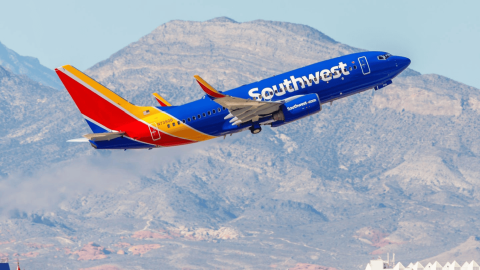Southwest Airlines (NYSE: LUV) Stock Price Target at $37: Morningstar Research
Southwest Airlines (NYSE: LUV) is realigning its operational model in a bid to restore profitability and investor confidence. Morningstar has responded to these initiatives by increasing its fair value estimate for the stock by 19%, from $31 to $37 per share, even as it maintains a "Very High" uncertainty rating and a "No Moat" classification. The airline’s transformation includes adopting seat assignments, introducing basic economy fares, and implementing enhanced yield management—all intended to better align with industry standards. Despite persistent headwinds, including aircraft delivery delays and volatile fuel costs, Morningstar sees improved revenue yields and capital allocation strategy as supportive of Southwest’s long-term prospects.
Research House View: Morningstar Upgrades Fair Value to $37
Morningstar's April 2025 update significantly adjusted its valuation model for Southwest Airlines, now pegging fair value at $37 per share, up from $31 previously. This upward revision reflects Southwest's newly outlined shift toward a higher-yield, lower-growth operating framework.
The company, once renowned for its simplicity and low fares, now plans to introduce tiered seating with premium options, assigned seating, and basic economy tickets to better compete with both legacy and ultra-low-cost carriers. These changes are forecasted to lift average revenue per passenger mile above $0.17, providing much-needed margin relief.
Strategic Overhaul: Moving Toward Industry Norms
Southwest’s transformation plan will see extra legroom seats introduced by late 2025, with full implementation of assigned seating set for 2026. These efforts aim to unlock $2 billion in additional profit by 2027.
The carrier will also start offering basic economy tickets through third-party travel platforms—effectively abandoning its decades-long resistance to service unbundling. This positions Southwest more competitively in a market increasingly shaped by price-sensitive consumers and digitally enabled fare comparisons.
Profit Forecasts and Valuation Drivers
Morningstar forecasts an earnings per share (EPS) of $3.56 in 2025, representing a significant recovery from recent suppressed levels. Capital expenditures are projected to hit $2.9 billion, largely tied to deliveries of Boeing 737 MAX aircraft.
| Metric | 2024 (Actual) | 2025 (Forecast) | 2026 (Forecast) |
|---|---|---|---|
| EPS | $0.72 | $3.56 | $3.96 |
| EBITDA | $1.98B | $4.25B | $4.99B |
| Free Cash Flow | -$16M | $578M | $1.24B |
The Price/Fair Value (P/FVE) ratio of 0.84 as of May 8, 2025, suggests that the stock remains undervalued relative to intrinsic estimates, providing potential upside for long-term investors.
Competitive Positioning and Industry Pressures
Southwest operates nearly 800 Boeing 737 aircraft in a point-to-point model, distinct from the hub-and-spoke systems used by Delta, United, and American. However, competitive pressures from both premium carriers and budget airlines are intensifying.
Delays in 737 MAX deliveries from Boeing have hindered growth ambitions and left Southwest with an excess of crew relative to active aircraft. This supply-demand imbalance has translated into structural inefficiencies and elevated unit costs.
The airline’s reliance on domestic routes does insulate it slightly from geopolitical risks, but it remains vulnerable to fuel price volatility, weather disruptions, and macroeconomic cycles.
Risks and Uncertainty: “Very High” Rating Persists
Despite operational recalibrations, Morningstar maintains a “Very High” uncertainty rating on Southwest, citing:
Exposure to oil price shocks and unpredictable weather events.
Fragility in travel demand due to economic slowdowns.
Heightened risk of irrational price competition, especially as pandemic-era tax buffers are exhausted and airlines revert to aggressive fare wars.
ESG-related risks also persist. Though currently manageable, potential carbon taxes or regulatory actions could dampen demand and raise compliance costs over time.
Capital Allocation and Balance Sheet Insights
Southwest earns a "Standard" capital allocation rating. The firm preserved financial flexibility during COVID by raising both debt and equity, maintaining a relatively conservative balance sheet. Leverage ratios remain below industry averages, and the company recently reinstated its dividend—a strong signal of confidence in cash flow recovery.
Notably, Southwest’s unique distribution model, with 85% of bookings through its own platform, gives it some pricing power and brand loyalty not easily replicable by competitors using third-party aggregators.
Comparative Valuation and Peer Snapshot
Southwest's P/E ratio of 25.45, though elevated relative to Delta (7.77) and American Airlines (6.48), reflects its cleaner balance sheet and lower operational leverage. The dividend yield stands at 2.38%, offering moderate income potential.
| Airline | Fair Value | Last Close | Price/Fair Value | Dividend Yield |
|---|---|---|---|---|
| Southwest (LUV) | $37.00 | $31.07 | 0.84 | 2.38% |
| Delta (DAL) | $36.00 | $48.54 | 1.35 | 1.21% |
| American (AAL) | $11.20 | $11.03 | 0.98 | 0.00% |
Outlook: A Transitional Period with Cautious Optimism
Morningstar expects Southwest to sustain load factors near 85%, supported by resilient domestic leisure travel and a measured rebound in business and international routes. However, the firm does not anticipate a return to the airline’s pre-2019 margin profile, citing higher structural costs and intensifying competitive dynamics.
Yet, Southwest’s commitment to fleet modernization, product differentiation, and revenue segmentation is expected to generate steady earnings recovery, especially if macroeconomic conditions remain supportive.
Disclaimer:Investors are strongly encouraged to conduct their own due diligence or consult financial advisors before making any investment decisions.
